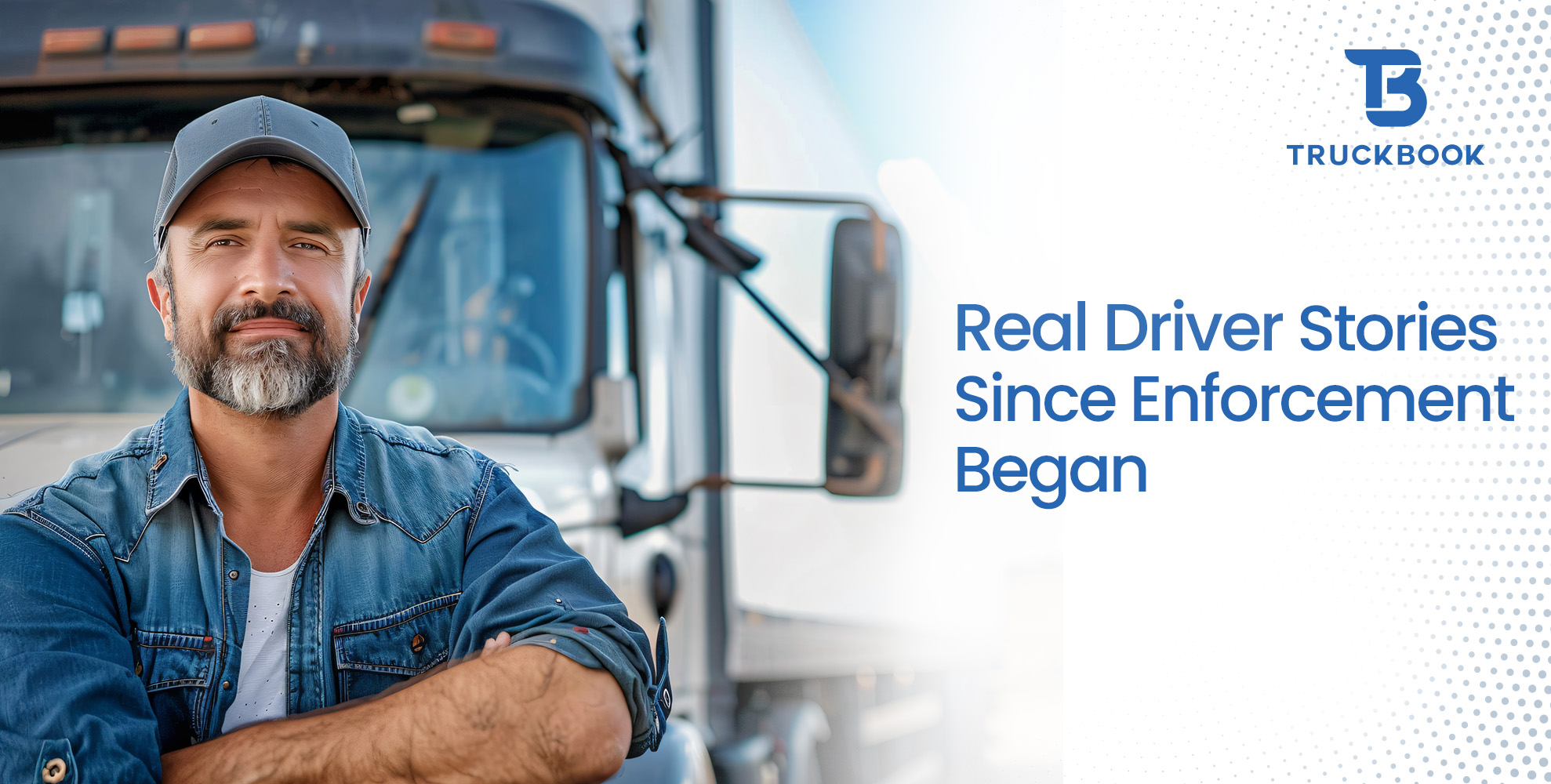The Federal Motor Carrier Safety Administration (FMCSA) has had a significant impact on the U.S. trucking industry by introducing regulations that enhance road safety, improve compliance, and standardize operations. Two key regulations, the FMCSA English Law and Electronic Logging Devices (ELDs), were implemented to improve safety and reduce driver fatigue-related injuries. In this article, we will explore the evolution of these laws, their impact on truckers, and how Truckbook, a leading app, helps truckers manage compliance.
Understanding FMCSA English Law and Its Impacts on Trucking
FMCSA English law encompasses a legal framework established by the Federal Motor Carrier Safety Administration (FMCSA) to regulate commercial motor vehicles (CMVs) operating in the United States. As a result, this law ensures that trucking operations comply with safety standards and regulations aimed at protecting both drivers and the general public. The FMCSA is an agency of the United States Department of Transportation (USDOT). FMCSA has the authority to enforce several rules to protect drivers and the general public.
FMCSA plays a key role in regulating trucking activities. Therefore, forwarding agents must adhere to both federal regulations and state laws. Additionally, FMCSA laws govern all aspects of trucking, including safety policies, compliance with state and federal hours of service, and regulations regarding the conduct and safety of truck drivers.
Furthermore, these regulations also affect the companies that employ truck drivers. Ultimately, the overarching goal of FMCSA is to eliminate deaths, accidents, and injuries resulting from the operation of commercial motor vehicles.
Here are some areas of FMCSA-regulated trucking:
Licensing and Certification: FMCSA regulates the qualifying requirements for acquiring a Commercial Driver’s License (CDL). This process ensures that a driver going through this process has the proper skills and qualifications needed to operate large vehicles.
Hours of Service (HOS): One of the more obvious components of the FMCSA English law is the rules governing the HOS constraints on the number of hours a truck driver can operate a commercial vehicle in specified time periods. The HOS regulations attempt to eliminate driver fatigue, a leading cause of accidents in the trucking industry.
Weigh Stations: FMCSA English laws govern the movement of trucks for inspections, weigh stations, etc. Examples are laws that require trucks to be stopped in weigh stations for safety inspection to ensure that trucks are properly loaded, not overloaded, and that they comply with weight laws.
Drug and Alcohol Testing: FMCSA regulates the requirement for someone who travels in a commercial vehicle to provide a drug and alcohol test.
FMCSA Vehicle Maintenance: FMCSA requires trucking companies to maintain the fleet of vehicles through required inspections of the vehicles to avoid accidents due to defective equipment.
FMCSA English Law Compliance Enforcement
FMCSA enforces these laws through roadside inspections, audits, and penalties for violations. This helps trucking companies act as a deterrent, ensuring compliance with safety policies and regulations. There are two types of penalties: fines and suspensions. Drivers may face a suspension of their CDLs, while companies could have their operating licenses suspended.
FMCSA English law also puts emphasis on the importance of driver training. FMCSA law mandates that companies provide training for their drivers to help them understand safety policies, regulations, and the best practices while on the road.
Electronic Logging Devices (ELDs): Changing Change the Trucking Industry
The implementation of Electronic Logging Devices (ELDs) in the trucking industry was one of the more significant regulatory changes in recent years. ELDs are electronic devices that automatically monitor a driver’s driving hours, helping fulfill FMCSA’s Hours of Service (HOS) regulations.
What Are ELDs and Why Were They Created?
ELDs were introduced to replace paper logs and help drivers comply with HOS regulations. Before the ELD rule, many truck drivers used paper logs, which posed risks of human error or falsified information. The FMCSA ELD mandate, effective in December 2017, requires all commercial vehicles to install ELDs to track driving time. The mandate applies to trucks engaged in interstate commerce and weighing over 10,000 pounds GVWR.
How ELDs Function
The ELD will automatically capture the driving time as it is connected to the vehicle engine and track the engine hours, location, and miles driven. The ELD will always be capturing data automatically and logging it with no documented possibility of inaccurate or falsified information.
Characteristics of ELDs generally include
Automatic log recording: ELDs monitor and record the driver’s driving time and required breaks. All records are logged automatically, which reduces the need for manual logs altogether.
Real-time truck tracking: The ELD has the ability to track where the truck is located and can be accurately accessed in real time by fleet managers and inspectors to ensure compliance.
Data keeps logs and stores logs indefinitely for audit. ELDs do an excellent job at storing logs over extended periods of time, and the logs can easily be viewed to facilitate auditors and enforcement agencies determining whether a driver is not adhering to HOS rules.
Alerts for compliance: An ELD alerts a driver when they are reaching their limit for driving hours or nearing the time for a break. When drivers receive these alerts or notifications, they must comply with becoming in adherence to the HOS regulations.
Impact of ELDs on drivers and the trucking industry
The implementation of ELDs has impacted truck drivers and the industry in many ways. While some truckers initially resisted their use, many have since embraced the benefits. ELDs reduce the time spent manually processing and tracking hours. This leads to less paperwork and fewer record errors. The data from ELDs helps drivers comply with HOS regulations. It also allows them to manage schedules, plan breaks, and stay aware of driving limits and compliance.
On the other hand, there are negative technology issues. For instance, truckers quite often mention that they have difficulty getting adequate parking during their mandated
The Future of ELDs and Trucking
As the transportation industry continues its technological transformation, the application of ELDs will only expand.The rise of smart fleets and the adoption of autonomous vehicles will require ELD technology to ensure compliance and safety on American roadways. Trucking apps like Truckbook, which integrate ELD technology, track driving hours, optimize routes, and connect drivers to available parking, are likely to become standard features in trucking applications.
As ELD systems continue to evolve, future capabilities may include real-time traffic updates and advanced logistical features. The ongoing development and integration of complementary technologies will help shape the future of trucking, creating a more robust, safer, and compliant ecosystem.
Challenges and Opportunities with ELD Compliance
While ELD compliance can provide benefits for the trucking industry, including safer roads and more accurate tracking of drivers’ hours of operation, some challenges remain for truckers who continue to use the ELD system. These challenges may include:
Cost of implementation: For small trucking companies or independent drivers, additional costs associated with purchasing hardware and maintaining ELD units can be burdensome.
Technical Issues: Some truck drivers reported having ELDs that malfunctioned or entered a technical disjuncture that caused inconvenience and downtime.
Privacy: The ELD system continues to track truck drivers’ locations and movements. Some truck drivers have raised concerns about the invasion of privacy and worries about future monitoring.
While there are some concerns with ELDs, their emergence has generally been a positive thing in regard to HOS compliance, accidents resulting from fatigue, and enhancing the safety of the trucking industry.
Conclusion
FMCSA English law and ELD regulations have significantly improved safety, compliance, and operational efficiency in the trucking industry. As technology continues to evolve, ELDs will remain essential for ensuring transparency and accountability on the road.
Truckbook is designed specifically for drivers, offering an all-in-one platform to stay ELD-compliant, manage routes, track hours, access CDL jobs, and connect with a trusted trucking community. Whether navigating complex regulations or staying on schedule, Truckbook gives drivers the tools they need to drive safely, earn more, and reduce stress.







